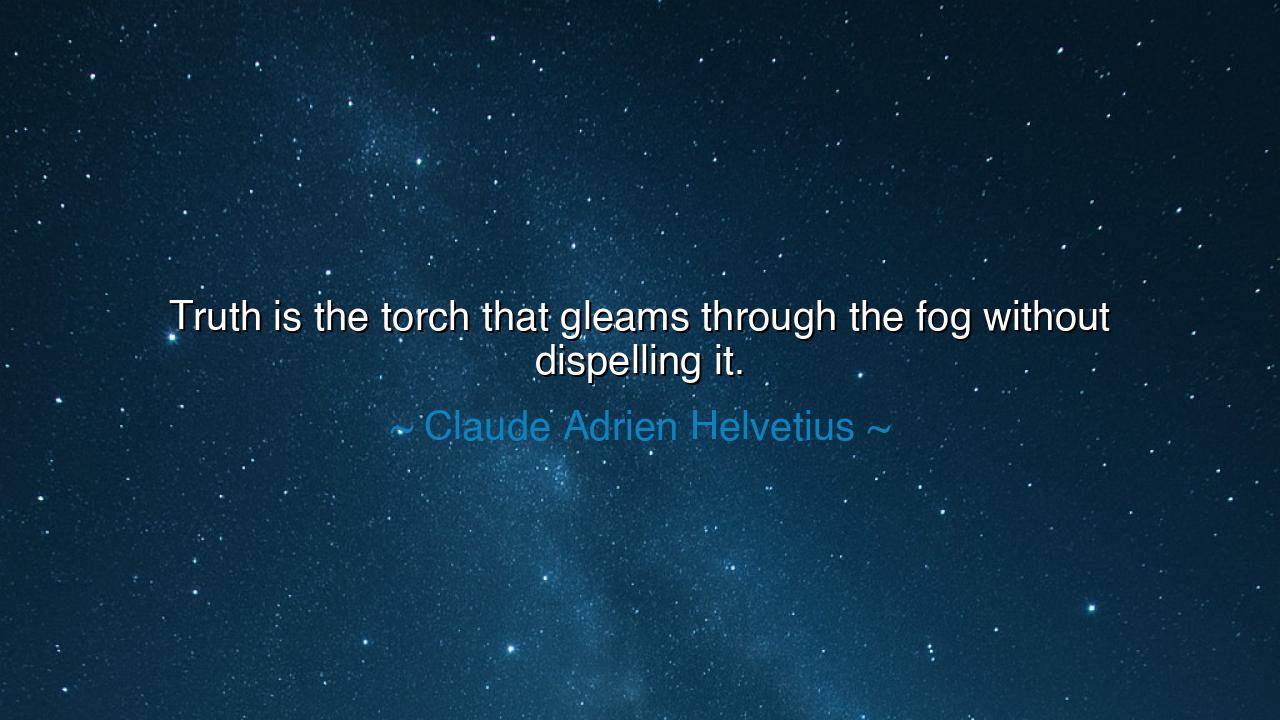
Truth is the torch that gleams through the fog without






Hear the words of Claude Adrien Helvétius, the French philosopher of the Enlightenment, who declared: “Truth is the torch that gleams through the fog without dispelling it.” These words shine with paradox, for they reveal both the power and the limit of truth. It is like a flame carried by a weary traveler through a fog-bound night: it gives light enough to see the path ahead, to guide the steps, to prevent stumbling into the abyss. Yet the fog itself remains, thick and immovable, refusing to be scattered. Truth does not banish the mystery of life; it only illuminates enough for us to continue forward with courage.
In these words, Helvétius expresses the condition of the human soul. We live in a world veiled by uncertainty, confusion, and the endless questions of existence. Why do we suffer? What lies beyond death? What is the meaning of our fleeting days? These questions are the fog—dense, inescapable, surrounding us on every side. The torch of truth does not clear the fog entirely, for some mysteries are too deep for mortal eyes. But truth, like a faithful companion, gives us enough clarity to act, to choose, to live with integrity in the midst of uncertainty.
Consider the story of the great scientific revolution. When Galileo lifted his telescope to the skies, truth gleamed like a torch. He saw moons circling Jupiter, phases of Venus, and the movement of the stars. The light revealed that the earth was not the center of the universe, that humanity’s place was smaller than once imagined. Yet even as this truth gleamed, the greater fog of the cosmos remained. For every mystery unveiled, deeper mysteries appeared. Galileo’s truth did not dispel the fog of the universe—it only gave humanity a clearer flame with which to walk into the unknown.
So too in the struggles of justice. When Martin Luther King Jr. declared that all men are created equal and must be judged by the content of their character, he bore a torch of truth. His words pierced the fog of hatred, prejudice, and division. Yet the fog did not vanish; injustice still lingered, confusion still clouded minds. But that flame was enough—it gave direction, it gave courage, it lit the way for millions to march forward, even if the full clearing of the fog remained for future generations.
Helvétius’ wisdom reminds us of humility. Too often men believe that truth, once grasped, will dispel all fog, solve every mystery, end all uncertainty. But this is arrogance. Truth guides; it does not conquer the infinite unknown. The fog is the condition of human existence, reminding us that we are seekers, not masters. Yet to despair of the fog is folly, for even a small torch is enough to save the traveler from stumbling into the pit. Better to walk with a flame through the mist than to sit in darkness and surrender.
The lesson, then, is this: do not demand of truth that it explain everything. Accept its limits with reverence, but treasure its light with gratitude. Use the torch you have—whether it be the truth of science, the truth of conscience, or the truth of faith—to guide your steps. Share it with others wandering in the same fog, for one torch may light another, and though the mist will never fully lift, together we may walk more surely.
Therefore, O child of tomorrow, remember: life will always be veiled in mystery. The fog cannot be dispelled by human hands. But within the fog, carry your torch faithfully. Seek truth with courage, hold it high, and let it guide your way. For though you will never banish the mist, you will walk with light, and your steps will leave a path for others to follow. Truth is the torch—it gleams, it guides, and though it does not conquer the fog, it is enough to lead us home.






BBorn
The image of truth being a torch but not clearing the fog feels like a metaphor for how truth can be only part of the solution. It reminds me of times when we seek clarity but are still left in confusion after learning the truth. Is it possible that some truths are just too overwhelming to fully comprehend, or perhaps we simply aren’t ready for them yet?
LTLan Tran
This quote also touches on the concept that truth is often seen as a beacon, yet its power can be somewhat limited. Maybe it’s not the truth itself, but the way it is perceived and interpreted that matters. How do you think people react to truth when it’s presented in ways that are hard to understand or absorb? Does the fog symbolize the complexity of human nature in accepting truth?
GLGa Lee
Helvetius' metaphor about truth being a torch that doesn't dispel the fog seems to reflect how revealing the truth doesn’t always lead to immediate resolution. It makes me question if sometimes, our understanding of truth is limited. Does the fog represent ignorance, or could it represent a deeper complexity that truth alone can’t resolve? What’s the role of context in how we interpret truth?
CPChinh Pham
It’s interesting how truth is described as a torch, a source of light, yet it doesn’t clear the fog. This makes me wonder if truth alone is enough to make progress in life or if it needs to be accompanied by action or understanding. How often do we rely on the truth to guide us, but still find ourselves stuck in the same place, not knowing what to do next?
PHphung hien
I find this quote intriguing because it suggests that truth, while illuminating, doesn’t always offer clarity. It’s as if the truth brings awareness but doesn’t always offer the answers people are seeking. Do you think that sometimes, the truth can complicate matters further? Can you think of an example where a difficult truth made things harder rather than easier?